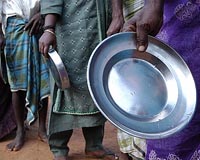 |
Rome (AFP) Sept 8, 2009 The rich diversity of food in indigenous communities across the world is threatened by the spread of Western eating habits through globalisation, a United Nations agency said Tuesday. About three-quarters of the genetic diversity once found in agricultural crops has been lost over the last century, the Food and Agriculture Organisation (FAO) said in a study. While ethnic communities in far-flung parts of the world can pick from a wide range of fruits and vegetables, Western industrialised nations rely heavily on four commercial crops -- wheat, rice, corn and soy, the FAO said. Traditional foods frequently contain very high levels of micronutrients that are good for the body, and the introduction of processed foods is causing health problems in some communities, it said. "The shift away from traditional food resources to commercial, convenience foods is often accompanied by an increase in diet-related disorders like obesity, diabetes and high blood pressure," said Barbara Burlingame, FAO senior nutrition officer. Globalisation threatens treasure troves that the researchers found in communities such as the Karens in Thailand, near the Myanmar border, where 661 inhabitants can choose from 387 food species, the FAO said. Kenya's Maasai tribes enjoy 35 different species of herbs, leafy vegetables and wild fruits, while the Inuit of Baffin Bay in Canada's north eat 79 different wildlife foods including caribou meat and ringed seal, it found. The study, titled "Indigenous People's Food Systems," was conducted with the Centre for Indigenous People's Nutrition and Environment at McGill University in Montreal. Share This Article With Planet Earth
Related Links Farming Today - Suppliers and Technology
 Feeding the world: which countries are most at risk?
Feeding the world: which countries are most at risk?Paris (AFP) Sept 7, 2009 Most of sub-Saharan Africa and South Asia are facing extreme or high risk of food shortages, according to a ranking of 148 nations obtained by AFP on Monday. The United States is least at risk followed by France, Canada, Germany and the Czech Republic, according to the Food Security Risk Index, calculated from dozens of variables that determine a country's capacity to feed its people. ... read more |
|
| The content herein, unless otherwise known to be public domain, are Copyright 1995-2009 - SpaceDaily. AFP and UPI Wire Stories are copyright Agence France-Presse and United Press International. ESA Portal Reports are copyright European Space Agency. All NASA sourced material is public domain. Additional copyrights may apply in whole or part to other bona fide parties. Advertising does not imply endorsement,agreement or approval of any opinions, statements or information provided by SpaceDaily on any Web page published or hosted by SpaceDaily. Privacy Statement |